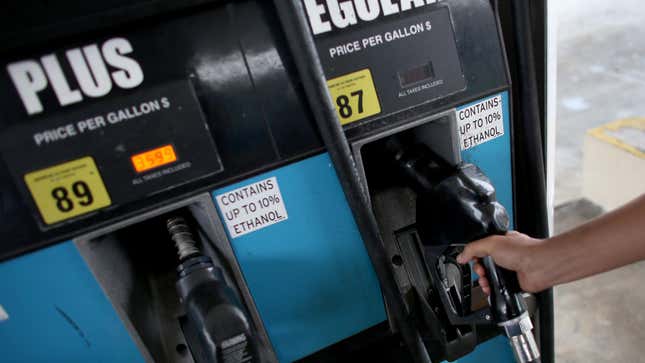
The Environmental Protection Agency is lifting the summertime ban on E15 ethanol sales across several Midwestern states. The Associated Press reports that drivers in Illinois, Iowa, Minnesota, Missouri, Nebraska, Ohio, South Dakota and Wisconsin will able to fill up on ethanol all year round forever starting in 2025. However, legislators in the region are pushing the Biden Administration to lift the ban this year.
The EPA issued an emergency waiver last year to allow summertime E15 sales in an attempt to keep gas prices low. As the E15 moniker implies, the fuel is 15 percent ethanol and 85 percent gasoline. The governors of the eight states impacted had petitioned the federal government to lift the ban permanently. The lift would be an economic boom for the farmers and the biofuel industry. Roughly 40 percent of the corn grown in the United States is dedicated to ethanol production.
The ban was initially put into place to protect air quality as E15 fuel produces more smog than standard gasoline. However, recent studies show that ethanol might even be worse for the environment than gasoline. Department of Energy-funded research published in 2022 found that ethanol production and combustion are 24 percent more carbon-insensitive.
Kim Reynolds, the Governor of Iowa, wants to waive the ban this summer and is pushing for E15 sales to be allowed from coast to coast. Not surprising. Iowa is basically buried in corn. In a statement, she said:
“As governor of the nation’s top ethanol producing state, I’m pursuing a waiver to continue offering drivers the option to purchase lower-cost, cleaner-burning E15 in Iowa this summer, and I won’t stop fighting for year-round E15 until it’s available nationwide. The solution to making America energy independent is growing in the Heartland.”
Waiving the ban’s final year would help keep fuel prices low, boost the economy of several Midwestern states and improve Joe Biden’s reelection chances. However, there could be long-term implications to tie the country’s fuel supply to land-intensive farming practices of a product that worsens smog.







